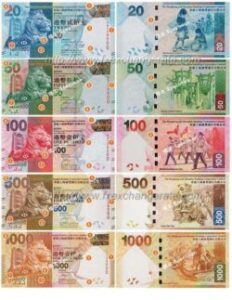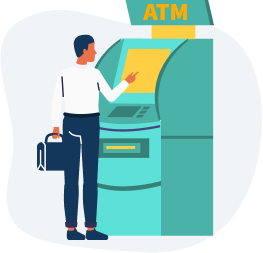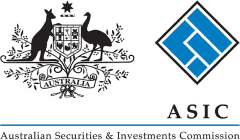Currency in Hong Kong
The Travel Money Guide to Hong Kong
Hong Kong has a lot of offer tourist including visiting Disneyland or ocean park, views from Victoria Peak or eating delicious food in Lan Kwai Fong or the night market. But it isn’t a budget destination and to get the most out of your trip, it’s a good idea to learn everything you can about the local currency and payment options before you go.
Want to learn more about the Hong Kong currency and how to get your hands on it for the best value? Read on to find out:
What Currency is Used in Hong Kong?

The official currency in Hong Kong Dollars, which has the international code HKD and the symbol HK$. There are 6 different Hong Kong banknotes, they are HK$10, HK$20, HK$50, HK$100, HK$500 and HK$1,000. In Hong Kong there are 3 different coins 10¢, 20¢ and 50¢.
While Hong Kong is part of China, it has its own currency, similar to Macau. Some businesses in Hong Kong may accept Chinese renminbi but you’re likely to get better value by paying in Hong Kong dollars.
How to Buy Hong Kong Dollar Before You Go
There’s a certain reassurance that comes with stepping off the plane (or cruise ship) already cashed up with Hong Kong dollars.
Buying HK dollars before you leave Australian shores isn’t just convenient. It can also save you money. But it all depends on where you get your Hong Kong Dollar in Australia and what AUD to HKD exchange rate you get. There are three main options:
- Buy Hong Kong dollars online and have it delivered or collect it in-store
- Buy from a money changer
- Buy at your home airport
Currency exchange offices at Australian airports are notorious for their poor rates and commissions so we recommend avoiding that option entirely.
You’ll easily find a bureau de change near you; even suburban shopping centres should have at least one. But it’s better to get your money from an inner-city bureau if possible. They have more competition, which is likely to drive their rates down.
If there’s already too much running around to do ahead of your trip, consider ordering Hong Kong Dollar online. You can choose to have them delivered or made available for pick-up at a location near you.
Online orders are often the best value too, especially if you go with S Money, which offers the same rates listed on Google and XE.com.
AUD to HKD
How Much Cash Should I Bring to Hong Kong?
Budgeting for your trip gives you a good idea of how much you may need for the length of your stay. This might keep you accountable, help you stretch your savings, or help you avoid having to convert currency back into dollars at the end of your trip.
The average daily travel budget in Hong Kong is about $200. Some of the expenses you might be looking at include:

$160 per night
A double room in a mid-range hotel

$10
Average lunch for 2

$9
Imported bottle of beer

$10
Average daily transport

$90
Admission for entertainment
How to Exchange Currency in Hong Kong
Places like Lan Kwai Fong and Ocean Park receive great numbers of tourists, so there are facilities to cater to money exchanges. Beyond these major destinations, it’s best to get cash before you venture into remote territory.

ATMs
ATM’s are located in lots of places in Hong Kong including main street, shopping centres, train stations and small convenience stores. In addition there are HSBC and Citi ATMs at the Nouméa airport, making things extra easy. The maximum daily withdrawal is around $3,000 so your 4 digit pin should work in Hong Kong ATMs to withdraw Hong Kong dollars.
Depending on your bank, you may have to pay for overseas ATM withdrawals and currency conversions. To reduce the amount you’ll pay in fees, try to withdraw just the right amount of money you’ll need for the duration of your trip.
Don’t forget: Let your bank know you’re travelling! If they detect a foreign transaction but aren’t aware you’re overseas, they could end up freezing your card.
Currency Exchange in Hong Kong
It’s easy to change your money in Hong Kong at money changers as there are lots of them. Most of them are independently owned so most of them look different to one another and most will have the word ‘Exchange’ in english. Furthermore there are plenty of money changers at Kai Tak international airport.
Money changers tend to offer marginally better rates than banks as many banks charge high flat fees. Also, banks only exchange currencies on weekdays.


Travellers Cheques
Traveller’s cheques offer some security, especially for long-term travel, and can be changed in major hotels and banks.
However with ATMs, digital mobile payments and money changers making currency exchange easy, there’s little need for traveller’s cheques today.
Using Your Bank Card in Hong Kong
Most Hong Kong businesses are well set up to receive card payments. Some of the best travel money cards include debit, credit and prepaid cards. But before you use your bank card willy-nilly, it’s worth reading up on the fees and charges you might incur.
Debit Cards
You’ll probably want a debit card if you plan to withdraw money from an ATM. While you may also be able to pay with a debit card in some businesses in the major destinations, you might discover some hefty fees on your account summary.
Depending on your bank, you could be hit with fees for foreign ATM withdrawals or currency conversions. But some banks are better than others; we recommend checking out Wise, ING and Revolut, all of which have travel-friendly debit cards that waive these charges.


Credit Cards
Credit cards can come with some enticing perks, including added security, loyalty programs, and even free travel insurance.
But are they worth it?
Major local businesses, including hotels, restaurants, airline offices, and department stores, accept credit cards. But you might have to pay a surcharge.
Mastercard and Visa are widely accepted. You may also be able to use your American Express card, though local ATMs won’t accept them.
Just be aware of additional charges you may incur for foreign transactions. These could include:
- International transaction fees
- High exchange rate margins
- ATM fees
- Potential ‘cash advance fees’ if you use an ATM
If you still prefer credit cards over any other payment, consider going with a company that offers cards that waive certain travel fees. Bankwest Platinum and 28 Degrees both have travel-friendly cards.
Prepaid Travel Cards
The biggest advantages of prepaid travel cards are that you can lock in a favourable exchange rate. You also get a handy back-up card.
Just remember that while they are convenient, you could end up paying a long list of hidden fees. Many travel cards still impose:
- Currency conversion fees
- Uncompetitive exchange rates
- International ATM withdrawal fees
- Initial load fees
- Reload fees
- Inactivity fees



